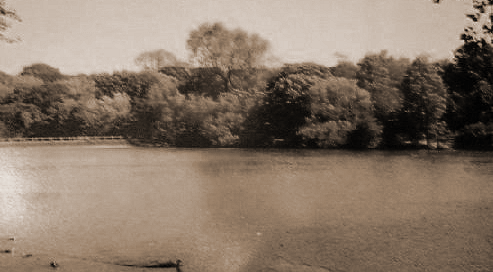August 2005

You walk like an orbit without a centre of gravity, even as I try to get you to stop spinning around your past. I want to ask you to stop thinking of all your cloudless days - they are irretrievable - but all you do is fist your hands in my hair and ask me to keep quiet. Why do you circle, I wonder, as a scavenger of someone’s happiness? Are the leftovers of my body that appealing to pick? Does your movement stem from fear? Is someone trying to shoot you down? Because all I can say is that you are too busy shooting yourself. Look, your longing is bullets cheesing holes into your body, your mouth keeps saying, Touch me, only without sound. I cannot hear you, so I don’t. I would have, otherwise. The sound of your voice breaks self-possession to pieces as a fist connecting sharply with glass, only I cannot gather your fragments fast enough before dissipation. I wish you wouldn’t, I wish you would just stop, I wish you would just smile at me as openly as I smile at you, I wish you would land beside me and pull me up with your claws, eat me if you wish, as long as there’s some sort of finality. I wish you could bring something to a conclusion. I wish there could be a fairytale ending, then I can wish that you can look happy and mean it. And Kaká thinks about Sheva, like that, often, even as he’s chuckling his face off or biting his lip playing football in the middle of Sheva’s lawn, even as Sheva hits a pass over the bounce of Kristen’s flower patch or grabs him in a tackle and they both fall over laughing.
Certainly it is never conscious. Most of the time Kaká never is concrete about sadness; he has better things to do, being happy for one, or excited, or peaceful, and football at midnight in Sheva’s garden is all three of those, surely. Them, passing each other over and scoring against trees, making a noise too loud for the neighbours, who suffer only under the threat of their fame. (Kaká says, “Are you going to give them another autographed jersey as apology?” Sheva says, “If they want.” - ) because they’re hooting like children and not like they’re nearly grown up, in their twenties, denying the grass in their hair and dirt on their jeans. And this happiness makes Kaká excited, excited for the possibilities of their friendship keeping them young and young and younger, an antidote for time. As if there isn’t the prospect of politics and money and power superimposed on what they love. This.
Kaká anchors the football between his feet.
“Pass it, come on,” Sheva says.
“Is there a park?” Kaká says.
“What?”
“A park, nearby.”
“Isn’t this good enough?”
“You of all people should know that it isn’t,” Kaká says.
And there is something different, Sheva knows. Even in the bright, deluxe garden with the impeccably arranged greenery, he knows, recalls that all of them think sometimes of the time before, before riches and cars, before. And Sheva doesn’t want to recall his childhood, he never recalls his chilldhood, but between being a child and now, the time when mediocre limelight and inexperience rendered him - and them all, at some point - free.
“You want a park?”
“Yeah, one of those with the swings and the plastic slides and the worms. I used to dig up worms.”
“You?”
“Digao and I liked worms. We played worm racing.”
“I wish I had a park too,” Sheva says. “Sometimes. A big abandoned one just to sit and talk.”
“Yes,” Kaká says.
“You can’t buy parks.”
“No, you can’t.”
“Do you want to sit down?”
“Do you want to sit down?”
“Let’s sit down,” Sheva says. “I’m tired.”
And they sit, the grass greyly green from the mix of fairy lights and midnight. And that’s peace, it really is, for him. Kaká splits a blade of grass with his fingers, sticks a stem into his mouth to chew, idly. They look out into the distance of the backyard, and further out, the brick wall ensuring their privacy. Their sudden degeneration into boyhood feels like a secret.
“You’re a little like football,” Sheva tells him, in the end.
Kaká raises an eyebrow.
“The game. Unpredictable in your happiness. If I can understand you it’s not because of your joy.”
“Happiness is simple,” Kaká says. “If you don’t think too hard.”
There’s a moment of silence. Crickets chirp.
“They’re noisy - ”
“Then you’re the stadium,” Kaká tells him suddenly.
“What?”
“The stadium.”
Curious look.
“Why?”
“Because,” Kaká says, “The stadium has many people in it. And in the middle there is a big, green field. So you, Sheva, have many different people in you that you show to us in little glimpses, and different people each time. But always there is a nice centre in you, and it’s green and wide and nearly almost the same size.”
“Is that a good thing?” Sheva says.
“Do you like being on the pitch?” Kaká says.
“Need you ask?”
They both smile.
“Sometimes though,” Kaká reflects, in addendum, “You’re a little expensive to upkeep.”
He waves at the size of the mansion, and they both chortle, aloud, this time.
“Wealth only means that I’m good at what I do,” Sheva says, and Kaká hums.
“You love football?”
“Among other things.”
“Like -“
“Like Jordan. Like Italy.”
“I like Italy,” Kaká says.
“I love Italy,” says Sheva. “I love Italy, my little Jordan, and football.”
And that’s when the sadness resurfaces, so intermittent, so brief that Kaká can’t place it before it disappears.
“At least we’re both happy,” Kaká says.
Hopes he’s not lying.